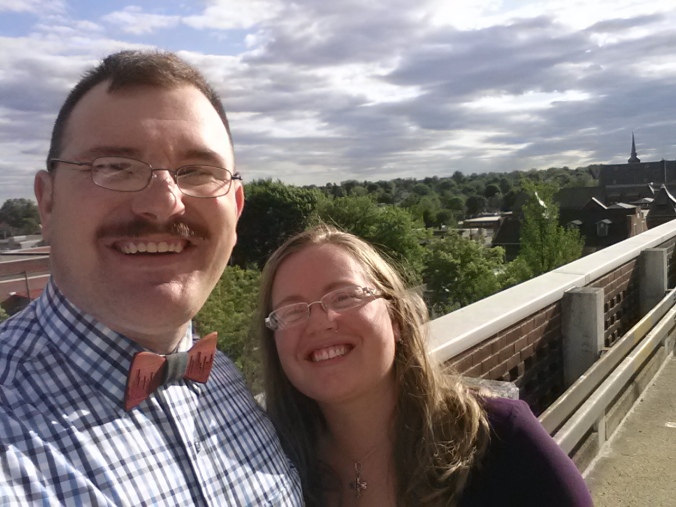A few nights ago, at the invitation of friends, Phil and I attended a dinner, Celebrating HOPE, highlighting the work of HOPE International. If you aren’t familiar with what they do, check out their website and be amazed. It’s not charity. Not at all. And it’s inspiring.
We said “yes” because a) it was a chance for a night out downtown and b) we like the work HOPE is doing and c) even though I’m an introvert, the friend who asked is one with whom I could always spend more time.
After a rooftop selfie at the parking garage, we entered the hotel/convention center unaware of what the evening would bring. A good meal, sure. Fun times with friends, definitely.
But it was the stories, and a question, that stuck with me.
HOPE works with people around the world to break the cycle of poverty through savings groups, small business loans and training. President and CEO Peter Greer spoke about how working with HOPE has changed him. Now when he reads the news about conflicts and disasters, he sees more than just a global story; he sees people he’s met or who work with HOPE groups in places like Burundi, Democratic Republic of Congo, Ukraine and Haiti.
And he talked about how people often respond in two ways to overwhelming global needs: they either become defeatist and feel nothing because they don’t think they can help or they behave like saviors, thinking they are the answer to the world’s problems.
“We were never meant to be the Savior,” he said.
And then he told us what people living in poverty actually need.
People in poverty don’t need our pity or our charity. They need our partnership.
One of the ways HOPE begins that partnership is by asking people about their dreams. Because rich or poor; young or old; American, European, African, or Asian, we all have dreams.
The most challenging part of the night came, though, when the HOPE country director from Rwanda shared about a biblical message that is helping people overcome the feeling of helplessness. When we lack, he said, we often think “If only this or that was different.” Instead of wondering what life would be like if we had more or different, he challenged people–including us–to answer this question:
What’s in your hands?
You can watch the inspiring video here. It’s almost 8 minutes long, but it’s worth your time.
“What’s in your hands?”
That’s the question I can’t stop thinking about. Because each of us has something. Time. A talent. A skill. Maybe money. HOPE encourages people to consider this question and use it as an investment.
I was humbled by the stories we heard about what people are doing with a little bit of loaned money and the talents they have. They have gardens and sweet shops and salons. They run laundry businesses and restaurants. They are elderly and young, fathers and mothers. The winner of the organization’s annual award is man who is raising 5 biological children and taking care of 11 orphans while also running a farm and restaurant. His goal? To help one person every day so that 365 lives a year are impacted.
My reaction after that night is to feel guilty. That I was born in the West. That I have so much and still find ways to complain. That my goals for life are not nearly so noble.
But that’s defeatist, and I don’t want to be that. And I don’t have any answers that would lead me to think I could save the world.
So, I’m left with partnership. And the question: What’s in my hands?
Today, I write about HOPE International because this blog is in my hands. It isn’t much, but I want you to know about these amazing people who are not content to live in poverty but who are given the chance to follow their dreams and change their communities. And I want you to know about this organization that literally invests in people’s dreams. And if you’re opposed to the idea of charity, then check out the work of HOPE.
And maybe ask yourself the question, too?
What’s in your hands?

[…] Guilt–and the avoidance of the issue that often follows–isn’t the solution. Neither is pretending that I can save the world. There’s a better way. […]